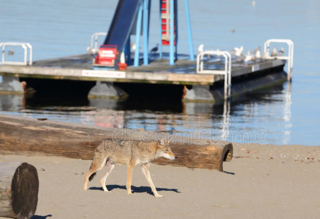Creativity
Can Clever Animals' Cognitive Skills Be Maladaptive?
Cognitive abilities such as behavioral flexibility may work against individuals.
Posted September 12, 2018
"The same cognitive abilities that aid animals in coping with human-altered environments may paradoxically predispose animals to conflict with humans." (Barrett et al. 2018, P. 6)
Human animals are all over the place, and numerous nonhuman animals (animals) are constantly trying to adapt to new or changing environments into which humans have trespassed. An individual's cognitive abilities likely play an important role in whether or not they can change their behavior so that they can coexist with humans who have taken over their homes, and paradoxically, highly adaptive individuals might actually be more likely to suffer at the hands of humans than less adaptive individuals. This is one of the main messages of an essay (available online) by the University of Wyoming's Lisa Barrett and her colleagues called "The cognition of ‘nuisance’ species." They studied "several cognitive abilities that are hypothesized to be of critical importance for species that are successfully utilizing human-altered environments, including neophilia, boldness, categorization, innovation, memory, learning, social learning and behavioural flexibility, and examine evidence that these cognitive abilities may also bring animals into conflict with humans."
The researchers begin by discussing the "cognitive buffer hypothesis" that suggests that large brains help individuals adapt to novel or changing environments (academic/scholarly essays can be seen here). They write, "Animals with larger relative brain sizes are thought to exhibit enhanced domain-general cognitive abilities, such as innovation, behavioural flexibility and learning, compared to animals with smaller relative brain sizes." Individuals who display their cognitive abilities should be better able than others to adapt to novel environs, including urban habitats in which humans live. However, it's also possible that individuals who are able to adapt better than others may also be more likely to come into conflict with humans, and this could lead to injuries and death. Along these lines, Barrett et al. write, "animals that are the most adept at acquiring anthropogenic resources, and those that exhibit high levels of cognitive abilities such as boldness, learning, innovation and behavioural flexibility, may also be the most at risk for lethal encounters with humans."

So, while certain cognitive abilities might work against individuals, it's also the case that they could harness these skills to avoid conflict with humans by changing their time budgets and activity patterns (for example, by becoming more nocturnal, as coyotes, black bears, red foxes, and bobcats have done) or by learning to discriminate among different humans and avoiding individual humans who might threaten their lives, as various birds have done.
While I was writing this post, I thought about another piece I recently wrote—"As Dogs Go Wild in a World Without Us, How Might They Cope?" I noted that while an individual's size, gender, or breed might be important for them to survive in a world without us, individual differences in social and cognitive skills and personality might be more important for them to be able to survive right after humans disappear and in subsequent generations. So, while some might argue that bold individuals might do better than more careful and timid dogs, it's also just as easy to argue that risk-averse individuals might do better because they'd no longer have humans to resolve conflicts with other dogs or with other nonhumans. In agreement with Barrett and her colleagues view about how individual animals might come to live alongside humans, it's also the case that absent humans but while facing novel encounters with members of the same and other nonhuman species, versatility and flexibility in the ability to rapidly adapt to changing conditions, social and otherwise, may be the keys to surviving immediately after and long after humans are gone. And, the ability to survive and to thrive without humans likely will result from a combination of various individual traits. There surely is lots of food for thought in these thought experiments.
Some practical aspects of understanding how animals' cognitive abilities are related to avoiding conflict with humans.
"By increasing our comprehension of the cognitive mechanisms underlying adaptation to anthropogenic change, we can better communicate our lessons to the public, fostering empathy for these clever species that may otherwise continue to be considered mere pests." (Barrett et al. 2018, p. 7)
There is also a practical side to understanding the ways in individual animals might use their cognitive abilities to live peacefully with humans. For example, devices that simultaneously tap into different sensory modalities seem to be more effective at nonlethal control than those that rely on a single sense to deter or frighten individuals so that conflicts with humans are avoided. The researchers write, "Candidates for training or cooperative mitigation strategies could begin with species that are known to be neophilic or exploratory (e.g. corvids, keas, macaques, raccoons). Such innovative methods may not only redirect the attention of nuisance individuals away from conflict-prone activities, but also illustrate the cognitive capabilities of nonhuman animals, which in turn may promote a more harmonious relationship between humans and nuisance species."
"The cognition of ‘nuisance’ species" is a very important essay because things are not always like they may seem. I fully agree when the researchers write, "The same cognitive abilities that aid animals in coping with human-altered environments may paradoxically predispose animals to conflict with humans." (p. 6)
Please stay tuned for further discussion of the ways in which individual cognitive capacities might be related to the ability to adapt to novel and changing environments. As we learn more about which skills are involved and how we might use this knowledge to mitigate the inevitable and growing number of animal-human conflict that arise, it'll be better for the nonhumans and humans who find themselves occupying the same spaces at the same time, a win-win for all.


